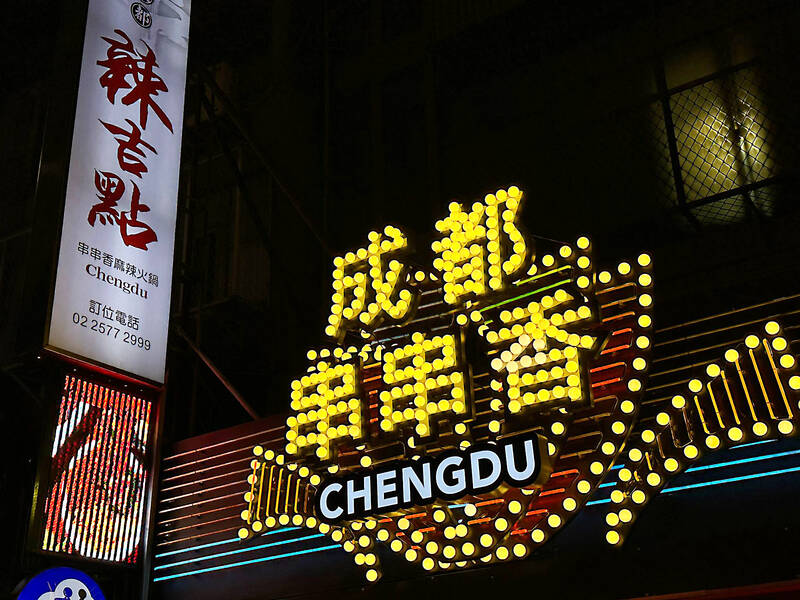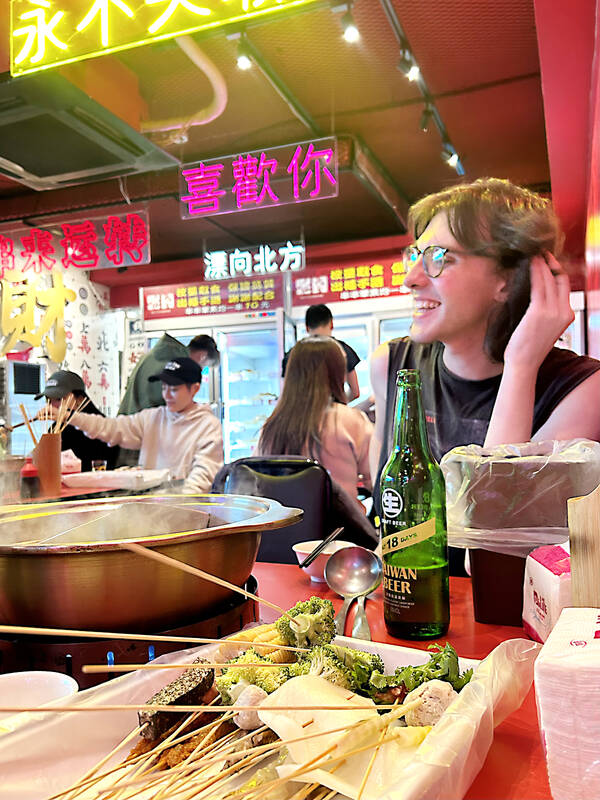Saturday night lights beckon us to the Instagram-lovers paradise that’s been blowing up our for-you pages recently with its neon signs, mahjong tiled walls and red-hot spicy hot pots.
Spicy Lucky Spot (辣吉點正宗成都串串香) in Songshan District (松山) is arguably the most Instagrammed hot pot experience in Taipei — but is it all photo props and vibey shots, or does it earn its mettle as the self-proclaimed “most authentic Chengdu hotpot experience?”
Armed with a mixed group representing the full spectrum from fussy eater to chili masochist, we push the customization of a shared hot pot to its outer limits. There were tears shedding, noses running and beers flowing, all components of the quintessential Sichuan dining experience.

Photo: Hollie Younger
This place is indeed a social media wonderland. From the outside, “Chengdu” flashes in spotlights more reminiscent of a casino or vintage Hollywood cinema, while inside neon lights hang from the ceiling, their cheesy characters exclaiming “I like you,” “a love that will never die” in retro fuchsia and cyan. The crowd is young, fun and like us, lining stomachs for a night on the town, albeit with clothes that will inevitably smell of boiled meat.
This spot’s unique draw is skewers offered at just NT$10 each — just grab your own from the fridges lining the back wall. An absolute bargain, I think, until I look despondently at a singularly skewered bamboo shoot smaller than my pinky finger. One broccoli floret? Really?
But it does heat up from here. The individual prawns are small yet refreshingly light, the squeaky pork meatballs are fantastic with a coating of spicy mala broth and the pigs blood cake is particularly good. The beef strip wrapped in a bushel of cilantro is the best offering for coriander contrarians like myself.

Photo: Hollie Younger
The skewer system certainly leads to a less intimidating ordering experience and offers a chance to make adventurous choices; for anyone up for a bitesize piece of duck heart or a taster of tripe.
Spicy Lucky Spot also offers a menu of set plates in gigantic portions — we opt for the classics, cabbage (NT$80), youtiao (油條, fried dough sticks) (NT$60) and enoki mushrooms (NT$80), paired with soft slithers of Matsusaka pork (NT$300), New Zealand beef sirloin (NT$320), a leaner cut, and best until last, US boneless Angus steak slices with their wonderfully marbled strips fat (NT$450).
We opt for the recommended mala and pork broth for three to four people (NT$480), arriving as a “half and half” yin-yang pot balancing harmoniously between a mild clear white broth on one side and a devilishly red Sichuan pepper soup with a strong right hook on the other.

Photo: Hollie Younger
We begin with weila (微辣), the lowest spice rating. Although the entire table is happy, this doesn’t even offer a tingle let alone a numbing sensation.
We ask our server to add a little more spice, who pours in an enormous amount of peppercorns and chilis. We watch in abject horror.
We’ve skipped the next spice level and blasted straight through to medium spicy or zhongla (中辣). This is how we know this place is authentic; by Taiwanese standards, a true Chengdu medium is a death sentence.
Even our strongest soldier wipes away their tears, as bottles of Taiwan Beer 18 Days (NT$120) are guzzled. The broth is equally balanced with chili and numbing heat, with the strips of marbled beef the perfect accompaniment to soak it all up, dipped into our hand-crafted sauce bowls of vinegar, soy sauce and traditional Chengdu sesame oil, which coats the mouth and offers a barrier to angry tastebuds against the roaring heat.
Spicy Lucky Spot now has eight branches across Taipei, but head to the Civic Boulevard (市民點) location for the best vibes and decor.
Sure, you’ll smell like boiled meat, and yes, the spice might break you — but with our bill coming in at just NT$650 a head, it’s a price worth paying for an evening of fiery flavor, flowing beers and Instagram-worthy vibes.

June 2 to June 8 Taiwan’s woodcutters believe that if they see even one speck of red in their cooked rice, no matter how small, an accident is going to happen. Peng Chin-tian (彭錦田) swears that this has proven to be true at every stop during his decades-long career in the logging industry. Along with mining, timber harvesting was once considered the most dangerous profession in Taiwan. Not only were mishaps common during all stages of processing, it was difficult to transport the injured to get medical treatment. Many died during the arduous journey. Peng recounts some of his accidents in

“Why does Taiwan identity decline?”a group of researchers lead by University of Nevada political scientist Austin Wang (王宏恩) asked in a recent paper. After all, it is not difficult to explain the rise in Taiwanese identity after the early 1990s. But no model predicted its decline during the 2016-2018 period, they say. After testing various alternative explanations, Wang et al argue that the fall-off in Taiwanese identity during that period is related to voter hedging based on the performance of the Democratic Progressive Party (DPP). Since the DPP is perceived as the guardian of Taiwan identity, when it performs well,

The Taiwan People’s Party (TPP) on May 18 held a rally in Taichung to mark the anniversary of President William Lai’s (賴清德) inauguration on May 20. The title of the rally could be loosely translated to “May 18 recall fraudulent goods” (518退貨ㄌㄨㄚˋ!). Unlike in English, where the terms are the same, “recall” (退貨) in this context refers to product recalls due to damaged, defective or fraudulent merchandise, not the political recalls (罷免) currently dominating the headlines. I attended the rally to determine if the impression was correct that the TPP under party Chairman Huang Kuo-Chang (黃國昌) had little of a

A short walk beneath the dense Amazon canopy, the forest abruptly opens up. Fallen logs are rotting, the trees grow sparser and the temperature rises in places sunlight hits the ground. This is what 24 years of severe drought looks like in the world’s largest rainforest. But this patch of degraded forest, about the size of a soccer field, is a scientific experiment. Launched in 2000 by Brazilian and British scientists, Esecaflor — short for “Forest Drought Study Project” in Portuguese — set out to simulate a future in which the changing climate could deplete the Amazon of rainfall. It is